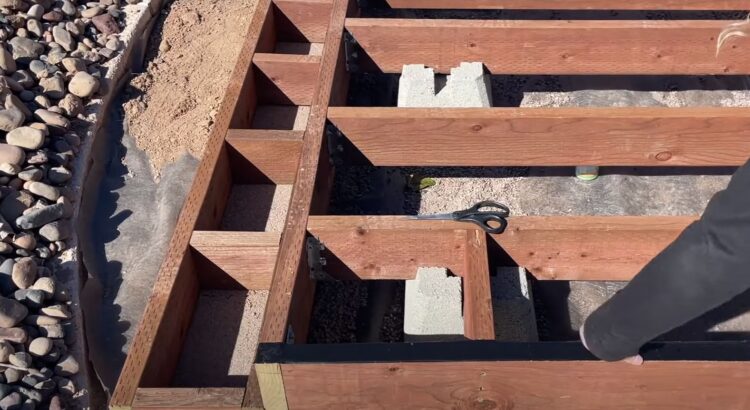Floating Decks: A Brief Overview
Floating decks, unlike traditional attached decks, aren’t anchored to the house. They sit on or slightly above the ground, held up by a foundational system, usually concrete blocks, that keep them “floating.” Given their design, these decks can be built almost anywhere in your backyard.
Advantages of Floating Decks
- Flexibility: Floating decks offer flexibility in design and location. They can be easily relocated if needed, making them a good option for those who might want to change up their outdoor space in the future.
- Cost-Effective: Compared to traditional decks that may require deep foundations or permits, floating decks are generally more budget-friendly.
- Easier Installation: For the DIY-inclined, floating decks are easier and quicker to install.
- Environmentally Friendly: Given their minimal footprint, floating decks are less disruptive to the natural environment. Less excavation means fewer disturbances to native plants and wildlife.
Points to Ponder
- Durability and Lifespan: Floating decks, since they rest on the ground, might be more susceptible to moisture and pests, potentially reducing their lifespan.
- Limited Weight Capacity: Without deep foundational support, these decks might not be ideal for heavier outdoor furniture or large gatherings.
- Maintenance: Ground-level positioning means they might require more regular cleaning and checks for mould or mildew.
Auckland Suburb Differences: Albany vs Mission Bay
Albany, with its modern urban vibe and rapid development, has houses with larger land parcels. Here, homeowners might have the luxury to allocate a bigger space for their floating deck, making it an attractive proposition. On the flip side, the coastal suburb of Mission Bay, with its scenic views, could benefit from floating decks as a platform to place seating or even a hot tub, capitalising on the panoramic ocean vistas.
It’s also vital to remember that the environmental conditions in the two suburbs can vary. The moist sea air in Mission Bay might call for more frequent maintenance of your deck compared to Albany.
Auckland Council Bylaw Requirements
When considering any new construction in Auckland, it’s paramount to be informed about council bylaws. For instance, in areas like Mt. Eden or Parnell, there are specific Heritage Overlay restrictions that can affect the type, size, and materials used for fencing. Auckland’s Unitary Plan outlines these rules. It’s always a good idea to consult with your local regional council or a professional before starting any project.
Fence Options and Considerations
A floating deck is an excellent addition to your outdoor space, but if you’re considering adding a fence, it’s essential to make choices that complement your deck. Here are a few things to keep in mind:
- Material Choice: Depending on your location, choose materials that resist local environmental factors. For instance, the salt-laden air in Mission Bay might not be kind to certain metals, but treated timber or composite materials can be a good choice.
- Privacy vs Openness: In bustling suburbs like Albany, you might opt for a taller, more private fence. In contrast, in serene spots like Mission Bay, an open design might be preferable to enjoy the views.
- Cost: While a floating deck might be a more cost-effective option, fencing can vary significantly in price. Consider the long-term costs, including maintenance, especially in the ever-changing Auckland climate.
To Summarise:
To answer the question, “Is a floating deck a good idea?” – It truly depends on individual needs, budget, and location. For many Aucklanders, a floating deck can be a valuable addition to their property, offering flexibility, beauty, and functional outdoor space. However, always keep local bylaws and environmental factors in mind to make an informed decision.
Key Takeaways: Floating Decks in Auckland
- Design Flexibility: Floating decks offer significant flexibility in both design and location, making them adaptable to varying backyard layouts and homeowner preferences.
- Cost and Environmental Benefits: Generally more budget-friendly than traditional decks, floating decks also have a minimal environmental footprint due to reduced excavation needs.
- Maintenance Considerations: Floating decks, especially in coastal areas like Mission Bay, may require more frequent maintenance due to potential moisture and sea air exposure.
- Local Bylaws Matter: Always consult the Auckland Unitary Plan and regional councils, as certain suburbs have specific restrictions on construction and fencing.
- Complementary Fencing: When adding a fence around your floating deck, consider materials and designs that not only stand up to local environmental factors but also complement the aesthetic of your deck.
Frequently Asked Questions: All About Floating Decks in Auckland
Do I need a permit to install a floating deck in Auckland?
While floating decks often don’t require the same permits as traditional decks, it’s crucial to consult the Auckland Unitary Plan and your local regional council to ensure you meet all regulations.
How long do floating decks typically last?
The lifespan of a floating deck depends on factors like material quality, environmental conditions, and maintenance practices. On average, with proper care, they can last anywhere from 10 to 20 years.
Are floating decks suitable for sloping backyards?
Yes, floating decks can be a great solution for sloping or uneven terrains. Their design can be adapted to multiple levels or shapes to fit the landscape.
Can I install a floating deck myself, or do I need a professional?
While DIY kits and guides are available, if you’re inexperienced, it might be wise to consult with or hire a professional. This ensures that the deck is safe, durable, and meets local regulations.
